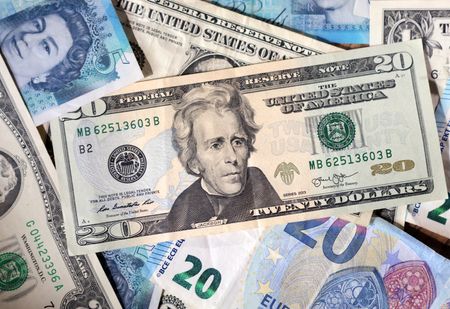By Caroline Valetkevitch
NEW YORK (Reuters) -Major stock indexes eased while longer-dated U.S. Treasury yields inched higher on Tuesday, with investors focused on U.S. fiscal concerns as Congress debated a bill for sweeping tax cuts.
The S&P 500 snapped a six-day streak of gains.
U.S. President Donald Trump pushed his fellow Republicans in Congress to unite behind the bill, but struggled to convince a handful of holdouts on the package, which would extend the 2017 tax cuts from his first term, among other things.
Investors worry that the bill will lead to the U.S. budget deficit growing at a faster pace than previously expected. Moody’s Investors Service downgraded the U.S. credit rating late on Friday, fanning concerns about the country’s debt load.
“With the Republican bill still up in the air, there’s just enough uncertainty to lead people to be a little bit more cautious and use this recent rally maybe to trim a little bit of their (stock) portfolio,” said Rick Meckler, partner at Cherry Lane Investments, a family investment office in New Vernon, New Jersey.
The Dow Jones Industrial Average fell 114.83 points, or 0.27%, to 42,677.24. The S&P 500 dropped 23.14 points, or 0.39%, to 5,940.46 and the Nasdaq Composite slid 72.75 points, or 0.38%, to 19,142.71.
Investors are also reassessing the recent rally and considering the potential fallout from the shifts in U.S. tariff policy, Meckler said.
Home Depot shares ended down 0.6%, although the home improvement retailer beat Wall Street estimates for first-quarter sales.
MSCI’s gauge of stocks across the globe fell 0.77 points, or 0.09%, to 881.62.
European stocks closed near nine-week highs, with utilities and telecom firms leading gains. The pan-European STOXX 600 index rose 0.73%.
Longer-dated U.S. Treasury yields edged higher amid the U.S. fiscal concerns.
The benchmark U.S. 10-year note yield rose 0.2 basis points to 4.477%. The 30-year bond yield gained 2.3 basis points at 4.965%. On Monday, it touched 5.037% in intraday trading, the highest since November 2023.
In a sign of broader market nervousness, Japanese super-long government bond yields soared to all-time highs on Tuesday, precipitated by a poor auction of 20-year securities. [JP/]
The Japanese 20-year yield jumped as much as 15 bps to 2.555%, its highest since 2000, and the 30-year yield hit a record high of 3.14%.
The dollar declined again, weighed down in part by more cautious remarks about the economy by Federal Reserve officials.
Among them, St. Louis Federal Reserve Bank President Alberto Musalem said despite the recent easing in U.S.-China trade tensions, the labor market looks likely to weaken and prices will head higher.
Traders expect at least two 25-basis-point rate cuts from the Fed by the end of 2025.
The dollar fell against the yen to a roughly two-week low of 144.095 yen, before trading down 0.2% at 144.495 yen, sliding in five of the last six sessions.
The Aussie dollar was last down 0.6% at US$0.6416 after the Reserve Bank of Australia cut benchmark interest rates by 25 basis points and left the door open to further easing in the months ahead.
In Canada, the annual inflation rate eased to 1.7% in April, above economists’ expectations for a 1.6% gain.
Oil prices were little changed amid uncertainty in U.S.-Iran negotiations and Russia-Ukraine peace talks.
Brent futures slid 16 cents, or 0.2%, to settle at $65.38 a barrel, while U.S. West Texas Intermediate (WTI) crude eased 13 cents, or 0.2%, to settle at $62.56.
Gold prices rose more than 1% as the dollar weakened further. Spot gold rose 1.86% to $3,288.96 an ounce.
(Reporting by Caroline Valetkevitch in New York; Additional reporting by Alun John in London and Ankur Banerjee and Johann M. Cherian in Singapore; Editing by Emelia Sithole-Matarise, Joe Bavier, Nia Williams and Richard Chang)









